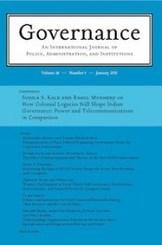Transnational Partnerships: Conditions for Successful Service Provision in Areas of Limited Statehood
Marianne Beisheim, Andrea Liese, Hannah Janetschek, Johanna Sarre – 2014
Transnational public–private partnerships (PPPs) are external governance actors in the field of development cooperation and vary in composition, potentially including nonprofit and for-profit organizations, state and public agencies, and intergovernmental organizations. This article analyzes the conditions under which PPPs have been successful in providing access to basic services (water, sanitation, and food) in areas of limited statehood in Bangladesh, India, and Kenya. We focus on 10 projects carried out by two PPPs that differ in two key respects: legitimacy and institutional design. We show that partnerships with high empirical legitimacy and an appropriate institutional design are best able to fulfill complex tasks in contexts of limited statehood. A participatory approach can promote legitimacy and thus success; projects that lack legitimacy are prone to failure. Additionally, a project's institutional design must address problems that commonly affect areas of limited statehood: It should provide access to resources for capacity development, ensure adequate monitoring, and be tailored to local needs.

